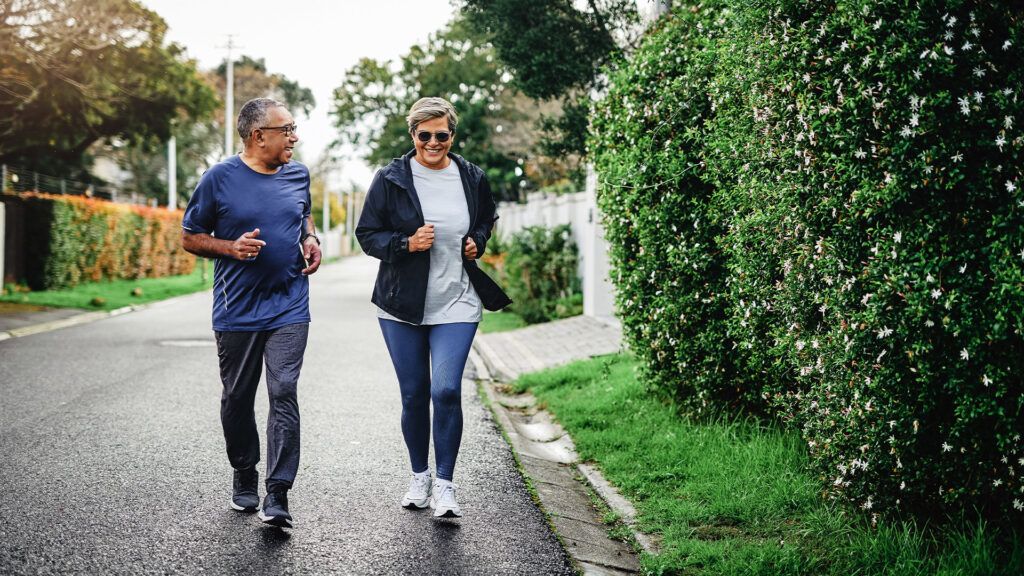
- A new study confirms aerobic exercise can substantially reduce the risk of early death from any cause, especially heart disease.
- The meta-analysis, which includes more than 20 million observations, shows that increased physical activity lowers mortality risk.
- Cardiovascular health impacts the health of the entire body, and exercise is the best way to promote it.
A large new study shows that people who regularly engage in aerobic exercise have a significantly greater chance of living longer and a lower risk of heart disease.
The meta-analysis, led by Grant Tomkinson, PhD, a research professor at the University of South Australia, analyzed the results of 26 systematic reviews of 199 unique cohort studies.
These trials investigated links between exercise, all-cause mortality, and cardiovascular health. All told, they involved 20.9 million researcher observations.
The researchers measured energy expenditure from cardio fitness with METs or “metabolic equivalent of tasks.”
The amount of energy spent sitting quietly is 1-MET. The findings show that for every additional 1-MET exerted via aerobic exercise, the risk of all-cause death lowered from 11% to 17% and the risk of heart failure reduced by up to 18%.
The results of this study are published in the British Journal of Sports Medicine.
Cardiorespiratory fitness is an important measure of overall health.
“Cardio fitness, often referred to as cardiorespiratory fitness (CRF) or aerobic fitness, reflects the ability of the heart, lungs, and blood vessels to supply oxygen during sustained physical activity,” said lead study author Justin J. Lang, PhD, a research analyst at CHEO Research Institute in Ottawa, Canada.
Aerobic exercise, Lang told Medical News Today, is the key to maintaining cardiorespiratory fitness.
There are many ways to strengthen your cardiorespiratory fitness through aerobic activities. Examples of common, heart-pumping aerobic exercises include:
- running
- swimming
- cycling
- brisk walking
- aerobic exercise classes
Jayne Morgan, MD, cardiologist and the executive director of Health and Community Education at the Piedmont Healthcare Corporation in Atlanta, GA, not involved in the study, explained to MNT:
“The heart is providing oxygen to every organ and tissue within the body. This allows for optimal performance of the body. As heart function declines, other organ systems are at risk of both a decreased blood flow as well as a decreased oxygen uptake and delivery. The stronger the heart, the more efficiently it pumps blood, keeping other tissues healthy and performing optimally.”
Lang noted additional reasons why a strong, healthy heart is key to overall health and longevity. He noted that robust circulation can help prevent heart attacks, strokes, and hypertension, “which are the leading causes of early death worldwide,” he said.
Exercise can also help keep cholesterol — a major risk factor for cardiovascular disease — under control, and a strong heart can help one respond “to the many stressors and demands of life,” Lang added.
Additionally, physical activity has been linked to a “reduced risk of some cancers, dementia, depression, kidney disease, and type 2 diabetes, but the mechanisms aren’t as well understood,” Lang said.
According to Lang, there are several ways to gauge your level of cardio fitness, although he recommends, when possible, trying “a field-based measure of cardiorespiratory fitness to get a more accurate assessment.”
For children, youth, and fit adults, Lang said the most widely used field-based test is a 20-meter shuttle run.
“This involves running back and forth between two parallel lines to the accelerating pace of an audio recording [designed for this purpose]. “The longer the person lasts, the higher their cardiorespiratory fitness score,” he explained.
For people who may have lower levels of cardiorespiratory fitness, there is an alternative: a walk test that measures the distance covered in six minutes of continuous walking.
Lang cited fitness wearables that monitor one’s heart rate following exercise. He also recommended a self-diagnostic questionnaire. He also cautioned the following:
“It’s important to note that while self-assessment methods can offer valuable insights into cardiorespiratory fitness levels, consulting a healthcare provider or fitness professional for a comprehensive assessment and personalized recommendations is advisable, especially for individuals with pre-existing health conditions or those new to exercise.”
It is always a good idea to speak with a physician before undertaking a new exercise regimen. A physician may ask for self-reports of weekly amounts of exercise or implement formal testing with treadmills, cycling, or bench step testing.
“An annual CRF measurement that is symptom-limited can be clinically useful to both guide and encourage wellness activity,” Lang said.
Another good reason to devise a heart-health exercise regimen with an expert is that different individuals may receive varying benefits from the same physical activities.
“Many factors are important to consider when trying to improve cardiorespiratory fitness, including genetics, age, sex, overall health status, and lifestyle factors,” Lang said.
“A highly fit athlete may require a high frequency of exercise throughout the week, at high intensity, and for longer sessions to improve cardiorespiratory fitness. Someone just starting out might benefit substantially from a brisk walk at low intensity for 20–30 minutes a few times a week,” Lang added.
Morgan noted that the study “specifically excluded athletes with extremely high-performance levels, as well as the debilitated on the other end of the spectrum. And while 1-MET is the measure via which the mortality is decreased, even those who achieved less than 1-MET saw benefits in all-cause mortality and death.”
Lang said not everyone responds to exercise in the same way. As a result, “it’s important to explore options and discover what works best for you,” he suggested.
“The important thing to consider when embarking on a physical activity journey is that something is better than nothing,” Lang said.
